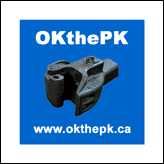
Calgary Alberta - CPKC CEO Keith Creel today touted the benefits of the railway's flagship
single-line Mexico Midwest Express service linking Chicago and Mexico.
Yesterday Union Pacific announced that it had shaved a day off of its rival cross border Falcon Premium intermodal
trains run in conjunction with Canadian National and Ferromex, as well as the joint UP-Ferromex Eagle Premium
service.
"If you've got a three railroad move, you can take a day out of it. But you can't take the complexities out of
three railroads run by three different operating groups being guided by three different sets of priorities versus
one," Creel told an investor conference today.
Interline intermodal service can't realize the same potential as single-line service unless the joint service has a
significant mileage advantage, Creel says.
UP has a great network with the shortest route between Chicago and the Mexican border, he says, but that mileage
advantage in the U.S. is erased by CPKC's shorter route from the Laredo border crossing to Monterrey and San Luis
Potosi, outside of Mexico City.
Falcon Premium service uses the Eagle Pass, Texas, gateway.
"So at the end of the day, their best day versus our best day, I think there's a place for both. But I do think,
if we do our jobs, that the premium freight is going to be on our railroad because it's going to be the most reliable,
the most consistent, and the transit time is going to be the best," Creel says.
MMX trains Nos. 180 and 181 make the 2,150 mile run between Bensenville, Illinois, and San Luis Potosi in four
days.
"We're doing it at a trucklike speed. We're beating what we advertised, and that train is 95 percent, 96 percent
on time. I look at it every day, every morning. If it gets late I know about it. It is really symbolizing the power of
this extended haul network, and it's attracting business," Creel says.
An unnamed auto manufacturer began using MMX service today to ship finished vehicles from Mexico to the U.S. and
Canada, Creel says.
Next week four new customers will begin shipping perishables between Chicago and Laredo, Texas, using CPKC's expanded
reefer container fleet, Creel says.
Initial volume is expected to be 250 loads per week.
A key advantage of the CPKC service is the cold storage supply chain the railway and partner Americold are building,
starting with a warehouse at the CPKC intermodal terminal in Kansas City, Creel says.
"It is going to be the premium supply chain connecting Chicago to Mexico or Mexico to Chicago," Creel
says.
Creel also noted that CPKC is targeting the Mexico-Chicago market, not the Mexico-Toronto market that rival Canadian
National is aiming at with Falcon Premium.
Both services were launched in May.
"I wish them well. I think they'll grow. I think they'll do OK," Creel says.
Canadian National Chief Financial Officer Ghislain Houle, who spoke after Creel at the Morgan Stanley investor
conference, says he was pleased that new Union Pacific CEO Jim Vena, who spent four decades at CN, was able to take a
day out of the Falcon Premium schedules.
"Here's what we need to do, and Jim knows this very well, and we know this. There's three railroads, FXE, UP, and
us. We need to work as a single line railroad. That's the key. We cannot let that train sit in Chicago, for example,
for a week or two. We cannot, we cannot, we cannot. We need to work, and we need to make these interchanges as fluid as
if it had been our own network, our own railroad going from Mexico to Canada," Houle says.
The three railroads will hold each other accountable for meeting service standards, Houle says, adding that's no
different than what can happen within the operating department of a railroad that's offering single-line
service.
For Chicago interchange with UP, the Falcon Premium relies on CN's congestion-free former Elgin Joliet & Eastern
route around the city, Houle notes.
CN sought to merge with Kansas City Southern but lost the battle to Canadian Pacific after an unfavorable regulatory
review.
Falcon Premium is CN's competitive response to the $31 billion merger of CP and KCS.
"I'm extremely excited by this because it allows CN to access Mexico without having to make a huge bet, and
without having any integration issues," Houle says.
Morgan Stanley analyst Ravi Shanker noted that his firm's customer surveys showed surprisingly strong demand for Falcon
Premium service.
"The key service from Monterrey to Toronto is five days, which is trucklike. So I think, like anything else, it
starts small, but the opportunity that presents is unbelievable," Houle says.
CN officials have said they believe the service ultimately can divert 350,000 truckloads annually, which would amount
to two train daily train pairs.
CN expects customers to move test loads before fully jumping on board.
Author unknown.
(likely no image with original article)
(usually because it's been seen before)
provisions in Section 29 of the
Canadian Copyright Modernization Act.
